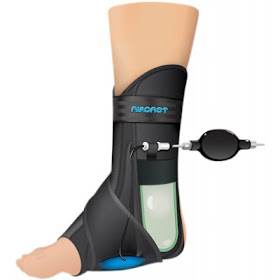Posterior Tibial
Tendonitis/Dysfunction/Tear (by Richard Blake, DPM)
The posterior tibial tendon is the major tendon to support the main arch of your foot. Damage to the tendon causes arch collapse to a major degree. Any sign that this tendon is having (beginning to have) problems must therefore be over treated to avoid long term issues. It is one of the most common surgeries on my patients because of the disability. I work long and hard on each one of these patients both trying to avoid surgery (usually), or in their post surgical rehabilitation. I encourage you to see my videos on You Tube for posterior tibial tendon problems. On YouTube, type drblakeshealingsole posterior tibial tendon and see what comes up. Rich
The top 10 treatments
for tibial tendinitis/dysfunction/tear are:
1. Understand the biomechanics of the
posterior tibial tendon to support the medial longitudinal arch and begin to
support the arch as part of all phases of the rehabilitation: Immobilization,
Re-Strengthening, and Return to Activity.
2. Start with OTC and advance to custom
orthotic devices with maximal support (this is not an injury to settle with less than
optimal support).
3. Learn several different taping
techniques: posterior tibial and circumferential arch.
4. Ice the area 3 times daily for 15
minutes each.
5. If possible, get a baseline MRI (may be
an important comparison 6 months later).
6. Most ankle braces hold the ankle
pronated which is bad for this injury, consider an Aircast Airlift PTTD brace
for times you are not using orthotic devices.
7. Create an initial pain free environment
with below knee removable boot/cam walker, and perhaps a Roll aBout.
8. If the injury is substantial (Grade 3-4
typically), have a hinged AFO custom made at a brace shop right at the start of
the injury (it can take awhile to get fitted)
9. Begin strengthening the posterior tibial tendon as quickly as possible with at least active range of motion exercises. The Posterior Tibial tendon is strengthened by pointing the ankle first and then moving the foot towards the other foot.
10. Definitely have a surgeon as part of the
treatment.

No comments:
Post a Comment
Thank you very much for leaving a comment. Due to my time restraints, some comments may not be answered.I will answer questions that I feel will help the community as a whole.. I can only answer medical questions in a general form. No specific answers can be given. Please consult a podiatrist, therapist, orthopedist, or sports medicine physician in your area for specific questions.